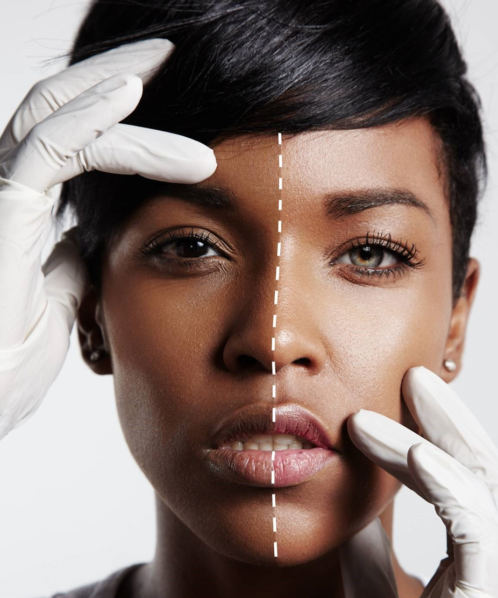
Bleaching is the act of deliberate skin whitening and it is commonly practised using cosmetic treatments such as whiteners and fading lotions.
[ad]
The essence of bleaching is to significantly reduce the composition of melanin pigments in the skin layers.
Melanin is the chief pigment produced in the skin and eyes, by cells known as melanocytes and is responsible for the darkened state of the skin, hairs and eyes. It is an effective absorbent of infrared light, visible light and ultraviolet radiation, thus, protecting the skin from the harmful heat sensation of these rays.
Additionally, melanin reduces free radicals and offers protection from reactive oxygen species which are the toxic bye products of cellular metabolic processes, which, if left unchecked in the body, can cause cellular stress, premature ageing of cells and other cellular maladies.
Some bleaching creams and lotions contain hydroquinone, steroids such as hydrocortisone, and occasionally mercury as their active ingredients. Dermatologists recommend skin-lightening creams with a 4 per cent to 6 per cent hydroquinone composition. Given that the amount of melanin deposits differs from skin to skin due to genetics, it is crucial to seek professional counsel before use. Mercury salts prevent the synthesis of melanin, making the skin appear lighter.
The Minamata Convention on Mercury sets a limit of 1 mg/kg (1 ppm) for skin-lightening products, but many cosmetics contain mercury levels higher than that to increase the whitening effect since consumers are determined to get rapid results from the use of these products. The downside to this is that mercury salt deposits tend to lodge in body organs when they are absorbed from the skin layers over time leading to mercury poisoning. Mercury poisoning signs and signs include malaise, skin numbness, hypertension, partial amnesia, kidney failure, strong sensitivity to light and tremors.
Bleaching the skin can occasionally result in skin allergies and may not be disastrous for people with sensitive skin. Common side effects of this practice include itching, burning sensations, and sometimes, unpleasant smells. Thus one should first conduct a skin patch test to determine the sensitive state of the skin in various areas of the body.
The practice of skin whiting is also used worldwide to treat uneven skin colouration, lighten scars, acne spots and freckles. Director General of, the National Agency for Food and Drug Administration and Control (NAFDAC), Professor Mojisola Adeyeye, has publicly declared the need for caution in the use of these whitening products, as they are culpable for the increase in the prevalence of various forms of cancers. Thus, over-the-counter skin whitening products aren’t safe to use and may not be verified effective for certain skin types.
Where to purchase skin-whitening products
The gold standard is consultation from a dermatologist for a suitable product to avoid irreversible conditions. Should you purchase bleaching creams at cosmetic stores or retail shops ensure due diligence by researching about the active ingredients and their potential negative effects.
Caution To Take While Bleaching
• Always read about the contents of the products and avoid any with mercury.
• Bleaching can make any skin conditions worse, such as rashes or open sores.
• After bleaching, wait six to eight hours before using soap or face wash on your skin.
• Never mix the constituents of several skin-whiting products as their compositions differ.
• If you experience unexpected symptoms, stop using the product and consult a dermatologist.
• Avoid staying under direct sunlight for minutes at a time as it may irritate the skin since sunlight aggravates skin sensitivity.
• Take a lengthy break after completing a bleaching routine to give the skin time to heal.
• Bleach should not be mixed with its contents in a metal container as the skin could react as a result of the mixture between the metal particles and the chemicals in the bleach. A glass bowl is a better preference.
[ad unit=2]








